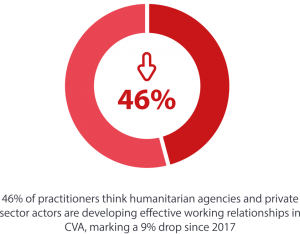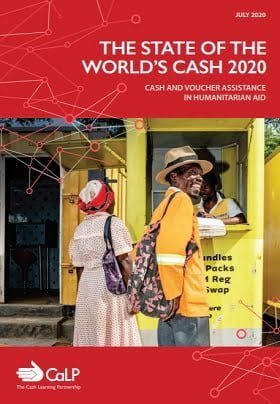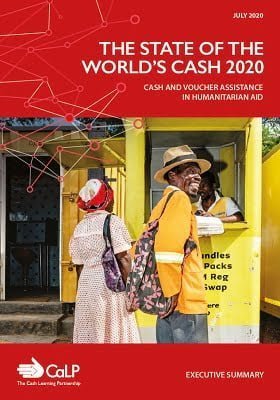State of the World’s Cash 2020 Chapter 6B: Investing in innovation for CVA
TRENDS AND RISKS
Despite growth in areas such as digital finance, appetite for CVA innovation has decreased slightly since 2017.

![]() Attention given to understanding and analysis of the value of innovation from a recipient perspective has increased.
Attention given to understanding and analysis of the value of innovation from a recipient perspective has increased.
![]() The growth of digital services provides many opportunities, but also demands careful consideration of potential of real-life harms to recipients given that sensitive data about them is collected and managed. There is also need for greater investment in risk assessment and risk management.
The growth of digital services provides many opportunities, but also demands careful consideration of potential of real-life harms to recipients given that sensitive data about them is collected and managed. There is also need for greater investment in risk assessment and risk management.
FINTECH AND CVA
![]() Mobile-based services and the use of mobile money for CVA has continued to grow. 60% of mobile money providers reported partnering with a humanitarian organisation to deliver CVA (GSMA).
Mobile-based services and the use of mobile money for CVA has continued to grow. 60% of mobile money providers reported partnering with a humanitarian organisation to deliver CVA (GSMA).
![]() There is increasing emphasis on digital identity provision and management as a critical enabler of access to aid and broader financial services, with donors, researchers, and implementers investing time and effort. Policy and practice has evolved, including the development of pilot blockchain based ID management platforms that put aid recipients in control of their data, and policies on the use of biometric technology in registration and ID verification processes.
There is increasing emphasis on digital identity provision and management as a critical enabler of access to aid and broader financial services, with donors, researchers, and implementers investing time and effort. Policy and practice has evolved, including the development of pilot blockchain based ID management platforms that put aid recipients in control of their data, and policies on the use of biometric technology in registration and ID verification processes.
![]() There has been steady growth in disintermediated (i.e. direct transactions removing intermediary institutions) and token-based financial service models. However, real-life application in large-scale humanitarian CVA seems to remain some way off.
There has been steady growth in disintermediated (i.e. direct transactions removing intermediary institutions) and token-based financial service models. However, real-life application in large-scale humanitarian CVA seems to remain some way off.
PRIORITY ACTIONS
- Humanitarian actors, and relevant private sector and research partners, should maintain a focus on strengthening collaboration and building long-term partnerships between humanitarians and financial service providers, including mobile money organisations, to ensure solutions are flexible and meet recipients’ short- and long-term needs.
- Humanitarian actors, and relevant private sector and research partners, should continue to explore and invest in innovations that prioritise quality outcomes for recipients and in which recipients find value. This should build on a shift from ‘tech for tech’s sake’ towards more inclusive technology and people-centered innovation.
- Humanitarian actors should develop stronger cross-sector collaboration to articulate and agree Data Rights and Governance standards to ensure that the increasing use of innovations in digital identity and data management comply with the need to “do no digital harm”.
Project leads
Further reading

The State of the World’s Cash 2020 – Full report
Report
Since the first State of the World’s Cash report we have seen huge developments in cash and voucher assistance (CVA), with a continued increase in scale driving changing roles and partnerships, and a growing emphasis on quality. This new report, State of the World’s Cash 2020, examines progress, changes, and challenges in the use of CVA within the rapidly shifting humanitarian landscape...

The State of the World’s Cash 2020 – Executive summary
Report
The State of the World’s Cash 2020 provides a comprehensive snapshot of cash and voucher assistance (CVA), with significant recommendations for anyone interested in humanitarian action. This report follows on from the first report, a seminal piece, published in 2018. Since then CVA has continued to grow and is now a major part of almost every humanitarian response. The total amount of CVA...



